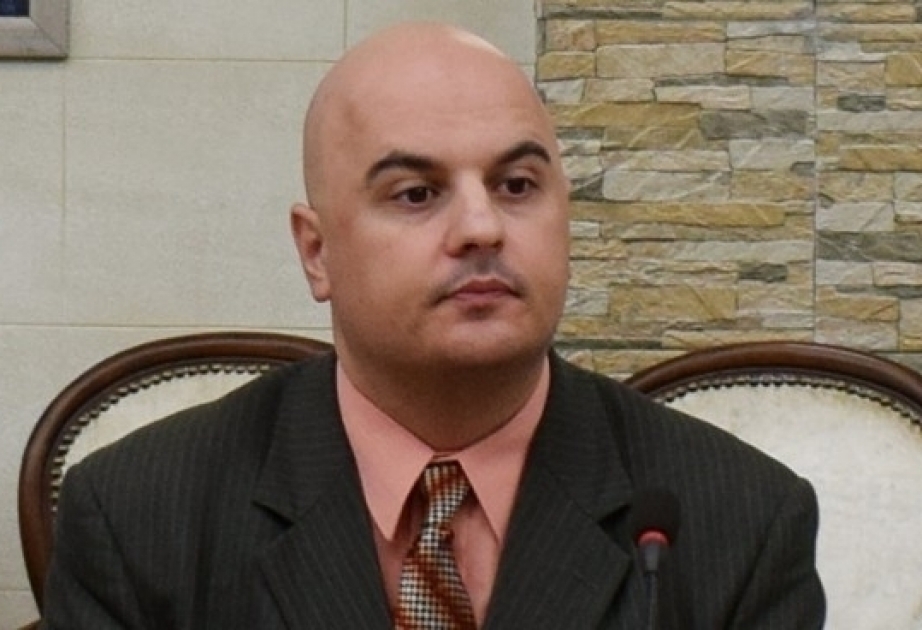Naim Kelmendi was the founder and chairman of the literary club "Faik Konica" in Switzerland, which has left a mark on the literary life of our exile there. Naim Kelmendi was born in Ruhot of Peja on September 10, 1959. He continued his studies at the Faculty of Philosophy in Pristina in the Department of Literature and Albanian Language. He writes poetry and prose, but he also deals with journalism and publishing, always writing for the Kosovar and Albanian periodicals. He has been a well-known and proven contributor in these areas of writing, especially with his publications, such as in the newspapers "Bota sot", "Pavarësia", "Pavarësia News" etc. From his poetic activity, poems have been translated into European languages, being presented in various anthologies, as well as in the press of the time.



Naim Kelmendi
Naim Kelmendi was the founder and chairman of the "Faik Konica" literary club in Switzerland, which for years has left its mark on the literary life of our exile there. Director and editor-in-chief of the magazine "Top Kultura", which was also published in Switzerland. Naim Kelmendi was the founder and editor-in-chief of the newspaper "Pavarësia", then former editor of the newspaper "Pavarësia News". By our literary critics of the time, he is considered one of our most distinguished poets in our modern poetry. Even in the field of our publicism, Naim Kelmendi stands out and is appreciated as one of our most vocal publicists, especially for his commitment and intellectual courage in the mission of the written word. NOAH He was also a war reporter for the national newspaper "Bota sot" in the Koshare war in 1999. Since 2002, after returning from Switzerland, where he had lived and worked since the beginning of the nineties, he currently lives and works in Kosovo.
In the poem "Te jesh vetvetja" ( "It's only a Memory" ) Naim Kelmendi appealed to his compatriots to preserve the tradition, history, culture and folklore of their village or city. Kelmendi wants to invite all those who want to listen, with these words: "To be yourself vertically / four-sidedly only yourself / on each last path of the beginning / even when your eyes were blinded / by the flashing lights / of fatzi deception / even when they suppress the ancient memory / even when they squeeze the juice of the unspeakable / even when they throw / the thought in a row / even when twist / yourself to remain / with that vertical attitude / don't bend even one step of your walk, as it is humanly / yours, biography, eternally / to be yourself / in your substance / that protects you from the frost / of human immorality / protects you from corruption/ of immoral mindsets / at all times / therefore, definitely being yourself / is a value that preserves the core / in the substance of being / and in the light of consciousness. The substance of any being, according to Naim Kelmendi, is based on the comprehensive coherence as well as it is focused on the national origin, the historical kneading or conception of a nation, why not also in the written and visual art of an evolving society, as well as shown in these verses. Although Kosovo is on a long and difficult path, in the creation of its identity, Kelmendi is fully aware of the preservation and protection of traditions, which have been preserved over the centuries, and the same practices must be followed to preserve the axis historical and national formation of any individual in Kosovo and the Albanian speaking regions. Naim Kelmendi is perhaps among the few writers who uses the element of verses to convey a framework of meaning that goes beyond the borders of a nation, Kelmendi's words and metaphors are simply the literal tissues of conveying national consciousness, as well as the will to stay ' vertically' to 'immoral mindsets' that want to distort the identity and way of life of a nation that is prepared to preserve the "light of consciousness". The Albanian renaissance period in poetry is represented by Pashko Vasa and other heroic patriots. In this new millennium, Naim Kelmendi looks at Pashko Vasa, and tries to revive those values that have been unintentionally forgotten by Albanian society, he naturally assumes the role, through his pen, of a true ambassador who stigmatizes and "revives "patriotism, national values in a new millennium, in the Balkans of our times, where you must be "definitely yourself". Walt Whitman, in his book, "Leaves of Grass" writes: Resist a lot, obey only a little", Kelmendi also embodies these virtues in his poem below. Naim Kelmendi has published the following books: The layer in question, 1985; Gordi's Knot, 1992; Albania, 1992; Why Pandora, 1993; What to do with pain, 1993; Satan With Another Face, 1994; Solar Eclipse, 1997; Facing Death, 1999; Albanian dies singing, 2000; Time for the Stones to Talk, 2001; The invisible surface, 2003; The murder of the deputy - monograph, 2003; The Battle of Koshare..., publishing, 2008; Views and reactions, publishing, 2008; In a life after Christ, 2010; Essence, 2010; The Albanian dies singing (second edition), 2010; Anthology of Poetic Pain, 2012; It's just a reminder, 2012 THESE, THE WORDS Words become poison in the mouth sick of a lucky prostitute left naked in the dead of night on a dirt road where only dogs and cats develop Chenche erotica in the group- the words come out of the lukewarm mouth and quickly turn into poison they judge the other's life harshly, they kill the conscience of the one who did not know is never aware of the process, rotation of things around its axis and words kill themselves harder than anyone's bullet, when you hang on their fate, turns their backs on the cold winter station, when all the buses have gone in all directions to return to him alone from that lonely X-station eating itself from the fir for irresponsibility to time, to the circle, to yourself, to chance...




No comments:
Post a Comment